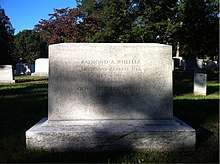Raymond Albert Wheeler
Raymond Albert Wheeler (July 31, 1885 in Peoria, Illinois – February 9, 1974) was a Lieutenant General in the United States Army Corps of Engineers.
Raymond Albert Wheeler | |
|---|---|
 Grave at Arlington National Cemetery | |
| Born | July 31, 1885 Peoria, Illinois |
| Died | February 9, 1974 (aged 88) Washington, D.C. |
| Allegiance | |
| Service/ | |
| Years of service | 1911-1949 |
| Rank | |
| Commands held | Chief of Engineers (1945-1949) |
| Battles/wars | Veracruz Expedition World War I World War II |
| Awards | Distinguished Service Medal (4) Silver Star Legion of Merit Hon. Knight Commander of the Order of the British Empire (KBE) Hon. Knight Commander of the Order of the Indian Empire (KCIE) |
Career
He graduated from the United States Military Academy in 1911,[1] subsequently participating in the construction of the Panama Canal and working on engineering projects in Mexico with Douglas MacArthur, who was then a captain in the Corps of Engineers. He fought in France during World War I, for which he won the Silver Star and a Distinguished Service Medal.[2]
At the time the United States entered World War II, Wheeler was developing a transportation network in the Middle East to ship munitions to the Soviet Union, which involved the extensive rebuilding of the railroads and highways of Iraq and Iran.[2] In autumn 1943, he was appointed to the South East Asia Command (SEAC) of the South-East Asian Theatre of World War II on the staff of Admiral Lord Louis Mountbatten, where he served as principal administrative officer and directed construction of the Ledo Road.[2] From February 1944, he served as Deputy Supreme Allied Commander, replacing General Vinegar Joe Stilwell,[1] and was the United States' representative in August 1945 at the Japanese surrender in Singapore.[2]
He served as Chief of Engineers for the United States Army Corps of Engineers from October 4, 1945 to February 28, 1949, managing major projects including the St. Lawrence Seaway and the Missouri Valley Development.[2] Following his retirement from the army, Wheeler joined the International Bank for Reconstruction and Development as an engineering consultant; among the projects he was consulted on was a 9,000‐mile survey of Indus basin water resources.[2] He directed the clearing of the Suez Canal following the 1956 Suez Crisis.[1]
Wheeler's military awards included the Silver Star, an Army Distinguished Service Medal with three Oak Leaf Clusters[3] and the Legion of Merit. In 1947, he was appointed an honorary Knight Commander of the Most Eminent Order of the Indian Empire (KCIE) for his construction of the Ledo Road,[2] and was also appointed an honorary Knight Commander of the Most Excellent Order of the British Empire (KBE, Military Division) in 1945.[1][4]
He died on February 9, 1974 at the Walter Reed Army Medical Center in Washington, D.C. and was buried in Arlington National Cemetery. He was survived by his widow, Virginia; a daughter, Mrs. William C. Wilkinson of Oakton, Va.; two sisters, Mrs. Visa W. Thrush and Estella M. Wheeler, and two grandchildren.[2][1]
Dates of rank
| Insignia | Rank | Component | Date |
|---|---|---|---|
| No insignia | Cadet | United States Military Academy | 15 June 1907 |
| No pin insignia at the time | Second lieutenant | Regular Army | 13 June 1911 |
| First lieutenant | Regular Army | 3 September 1913 | |
| Captain | Regular Army | 1 July 1916 | |
| Colonel | National Army | 2 November (accepted 6 November) 1918 | |
| Major | Regular Army | 5 August 1917 (temporary) 1 July 1920 (permanent) | |
| Lieutenant colonel | Regular Army | 11 July 1918 (temporary) 1 August 1935 (permanent) | |
| Colonel | Regular Army | 1 February 1940 | |
| Brigadier general | Army of the United States | 29 September 1941 | |
| Major general | Army of the United States | 11 March 1942 | |
| Lieutenant general | Army of the United States | 21 February 1944 | |
| Major general | Regular Army | 1 October (accepted 4 October) 1945 | |
| Major general | Regular Army, Retired | 24 January 1948 | |
| Lieutenant general | Regular Army, Retired | 1 March 1949 | |
See also
- China Burma India Theater of World War II
- Major General Albert Wedemeyer, Lieutenant General Daniel Sultan
References
- "Raymond Albert Wheeler". Arlington National Cemetery. Retrieved 2009-06-01.
- "Gen. Raymond Wheeler Dead; Led Army Corps of Engineers". The New York Times. 1974-02-10. Retrieved 2018-03-31.
- http://valor.militarytimes.com/recipient.php?recipientid=100469
- "Communique'" (PDF). Press Information Bureau of India - Archive. Retrieved July 5, 2017.
- Official Army and Air Force Register, 1948, p. 1940.
- Official Army Register, 1950, p. 868.
| Military offices | ||
|---|---|---|
| Preceded by Eugene Reybold |
Chief of Engineers 1945—1949 |
Succeeded by Lewis A. Pick |